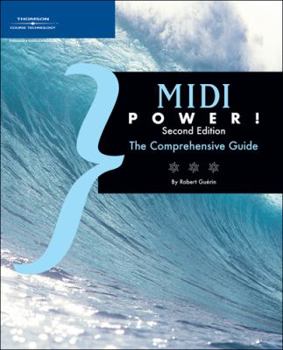MIDI Power!: The Comprehensive Guide
Select Format
Select Condition 
Book Overview
From how MIDI works, to how to connect devices through it, to how it integrates into a computer environment, MIDI Power , Second Edition is a comprehensive reference guide to MIDI. The book provides an in-depth look at MIDI, its messages, and protocols, and the information necessary to navigate it with ease. Learn when to use MIDI, how to edit MIDI, what technology uses MIDI, what software uses MIDI, and how MIDI is integrated into computers and what...
Format:Paperback
Language:English
ISBN:1598630849
ISBN13:9781598630848
Release Date:September 2005
Publisher:Alfred Music
Length:999 Pages
Weight:1.85 lbs.
Dimensions:1.1" x 7.5" x 9.1"
Customer Reviews
4 ratings
good.
Published by Thriftbooks.com User , 14 years ago
Great introduction into MIDI and it's applications, and a good reference guide for experienced users, and new users alike. I bought this for a MIDI class I'm taking, and it's actually quite an interesting read, if you're into that kind of stuff that is. Great, in depth, and easy to understand.
Nice Reference Book
Published by Thriftbooks.com User , 16 years ago
Moving forward with technological change and software upgrades we tend to forget the nuances of MIDI that we learn along the way. MIDI POWER has these chronicled, and more, in organized detail. It is good to refresh your memory from time to time, and so this book goes on the reference shelf.
Marvelous MIDI
Published by Thriftbooks.com User , 16 years ago
I am over halfway through this book, and it is the best book on all things MIDI that I have ever read. I intend to use it to teach MIDI. Unlike most books that do a great job for two chapters then make a quantum leap - THis one takes you through painstaking explanations of things that the other tomes do not cover. Most excellent.
Exactly what I was looking for!
Published by Thriftbooks.com User , 20 years ago
In the end, when a shopper decides to look at the user reviews, he/she usually does so not to see the average opinion (that is reflected by the averaged rating at the top of the page). Instead, the shopper is looking to see if the reviewer had similar needs when they originally bought the book and whether or not these needs were satisfactorily met. So, without going into the book itself too much, let me just start by telling you what needs I had prior to buying this book.I am an electronic composer (think Stockhausen not Chemical Brothers...if you don't know who Stockhausen is, you probably aren't coming from my perspective - although that's not a bad thing) who only recently began building a studio. In addition to studying electronic and acoustic composition at the collegiate level, I also have studied film scoring. Naturally, my review could very easily apply to you if you aren't this type of musician (I will try to assess the book's usefulness to other types below). I currently own a few hardware synths (naturally with MIDI capability), a nice laptop, Sibelius notation software, a PA system, a midi port, and Cubase SX 1.0. I initially bought this book to solve a multitimbralilty issue I was having with Cubase (which I had just purchased). Although I had learned audio/midi sequencing on ProTools at school, I was using different synths and found it difficult to achieve similar control over my synths at home. Although this book didn't quite help me figure out my problem (I probably needed Cubase SX Power! instead), it did give me a great foundation for MIDI knowledge. The book covers everything from a mildly technical description of MIDI (even through the specifics of System Exclusive messages) to different types of hardware and software. Fortunately, this book also addressed some audio quality issues I was curious about (low-latency, sampling and bit rate, etc...). I definitely would recommend this book to anyone looking to understand MIDI. This applies to beginners (it reads easily) as well as people with a moderate amount of MIDI info. I would not recommend this book to a MIDI pro looking for really detailed specs. Concerning your background, I think the book pretty much applies to all types of musicians who might intend to use MIDI. The book is technical in content, not in its communicative style (i.e. although there are some professional things to learn here, they're presented in a layman-friendly way). This book doesn't ever go into specific detail about any one software application or piece of hardware...instead it makes generalities concerning types of software/hardware. For example, statements concerning audio/midi sequencers apply equally to Cubase, Logic, Digital Performer, ProTools, etc... One complaint I have is that because music technology is evolving so quickly, the book is already showing its age (even though it was written in 2002). With the advent of USB 2.0 surpassing firewire connections and certain other a




